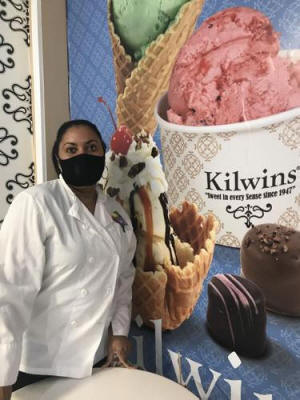COVID-19 mandates fail to make Chicago chocolatier bitter
 Send a link to a friend
Send a link to a friend
 [March 23, 2022]
Ann Miller | Illinois Policy Institute. [March 23, 2022]
Ann Miller | Illinois Policy Institute.
Jackie Jackson walked into an ice cream
shop after losing her mother. It was comfort. She decided Chicago needed
more of it.
She opened a Kilwins Ice Cream and Fudge franchise on Michigan Avenue,
another in Hyde Park and was launching a Navy Pier location when the
COVID-19 pandemic and Gov. J.B. Pritzker’s mandated shutdowns hit.
“When COVID first started, I was devastated because we just got into our
Michigan Avenue store. The rent was like $14,000 a month. So, it was a
disaster. I just saw my whole life just going down the drain.”
Jackson and the contentment she offered her customers were deemed
“non-essential.” They had to close their doors. The back rent on the
Michigan Avenue store alone hit $70,000 and the other bills kept coming.
Then, George Floyd was murdered. Riots in the summer of 2020 swept
through her Michigan Avenue store.
“I dropped a pen on the floor, and I looked up and saw all my glass
shatter. They took the iPad, the laptop; they even took stuff that
doesn’t make sense. A couple of blocks away there was another African
American [business] owner outside sweeping some glass and he was knocked
unconscious. Never again would I try to protect anything; it’s just not
worth my life,” Jackson said.
All the while, government-promised paycheck protection and loans for
small businesses remained elusive.

“We kept being denied the PPP loan and we didn’t hear anything for a
long time. We didn’t have any time. We had to pay our bills,” Jackson
said. “We invested everything in opening our Navy Pier store and we
couldn’t qualify for any types of loans or grants.”
Jackson and her partners persisted. They found a way to open the Navy
Pier location, a decade-long effort they made a success despite the
pandemic mandates.
But another setback awaited. In November 2021, 26 bullets pierced their
Hyde Park location. No one was injured, but they closed the store.
“We had to take a timeout, because we never really dealt with the
emotional effects of the looting in 2020,” Jackson said. “Mental health
is important, and it was very important to me and my team members and my
staff that we just took time to really take care of ourselves and closed
the store temporarily.”
The pandemic waves and government mandates shuttered many businesses,
causing nearly one in three hospitality and restaurant workers to lose
their jobs. Only 72% of those jobs have returned – the worst rate in the
Midwest and third worst in the nation.
[to top of second column]
|

Jackie Jackson
Photo provided

“But one thing about this pandemic, it pretty much was a reset button,”
Jackson said. “We got a timeout. We had nothing else to do, so we
started learning. We reinvented ourselves.”
Across Illinois, 84,200 leisure and hospitality jobs are still missing
compared to before the pandemic. Chicago lost over 1,500 restaurants in
the past two years.
Jackson and her team continue working to reverse those numbers.
They took over the Kilwins in Geneva, Illinois. That means they doubled
their Kilwins locations during a pandemic.
That time spent researching showed Jackson an opportunity with
drive-thru dining. They found an old bank in Chatham and received a
grant from the Neighborhood Opportunity Fund to bring in a West Coast
chain, Fatburger, to Chicago’s South Side. They’re set to open in April.
Despite rising costs for products, supply chain snags and violent
encounters at her stores, Jackson remains hopeful.
“We’ve decided that we’re not leaving Hyde Park. We can’t wait to come
back with a brand-new store and really give that neighborhood what they
deserve,” she said. “We can’t let this crime stop us.”
It would be easy to understand Jackson being a little bitter on this
two-year anniversary of the pandemic lockdowns. Crime, failed promises
of help and government restrictions fueled by a governor allowed to rule
by executive order for two years have left many that way.

“Between the looting and loss of tourism in downtown, in 2020 we were
down 75% in sales. Two years later, we’re down 55% in sales. But because
the landlord is working with us on Michigan Avenue, we’re pressing
forward.”
Jackson is too busy pressing forward to do “bitter.”
“So we no longer want to be viewed as the victim,” she said. “We want to
be viewed as being very victorious.”
Ann Miller is the staff writer for the Illinois Policy
Institute. |